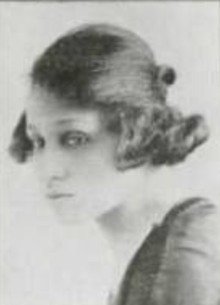Lillian Skinker Malone
Lillian Skinker Malone | |
|---|---|
 Lillian R. Skinker (later Malone), from the 1922 Howard University yearbook for professional schools | |
| Born | April 24, 1891 Caroline County, Virginia |
| Died | July 22, 1992 (age 101) Washington, D.C. |
| Relatives | Wesley A. Brown (son-in-law) |
Lillian R. Skinker Malone (April 24, 1891[1] – July 22, 1992) was an American educator based in Washington, D.C.
Early life and education
Lillian Rose Skinker was born in Caroline County, Virginia, and raised in Washington, D.C., the daughter of Beckley Merriman Skinker and Rose (or Rosa) Allen Skinker. Her father was white, and her mother was Black. She had two brothers, Edward and Stanley, and three sisters, Ethel, Stella, and Laura.[2]
She attended M Street High School and trained as a teacher at Miner Normal School. In 1919 she completed a bachelor's degree in education at Howard University; she earned a law degree at Howard's law school in 1922.[3] She earned a master's degree from Howard in 1934,[4] with a thesis titled "A study of the rate of adjustment in migrant students to the elementary schools of the District of Columbia at the several grade levels as measured by scores made on standardized reading tests" (1934).[5][6]
Sorority activities

She was a member of the Alpha chapter of Delta Sigma Theta,[3][4] and in 1918 helped establish the Gamma chapter at the University of Pennsylvania, with Sadie Tanner Mossell, Virginia Alexander, and Pauline Young among its first members.[7] She also helped to organize Epsilon Sigma Iota, a sorority for Black women in the legal profession.[8] In 1946, her daughter was accepted as a pledge in the Alpha Xi Delta sorority at the University of Vermont; because she was Black, the sorority chapter was put in probation, with the explanation that "we have so many Southern chapters, you know."[9][10]
Career
As a young woman, Skinker was known in Washington as an athlete in multiple sports; she swam competitively, played on a basketball team,[11][12] and was the Black women's tennis champion in the city.[4] She was a teacher and a principal at several schools in the city, including Reno, Smothers Elementary, and Stevens. In 1927, she and two other teachers resigned when they were charged with violating the district's maternity leave rule.[13] She was principal of Stevens Elementary School from 1935 to 1953.[14]
Malone organized an early program for physically disabled students, which developed into the Sharpe Health School.[4] In 1950 her students attended a performance of the National Symphony Orchestra, along with students from white schools; "Mrs. Malone was bound and determined that Stevens children did not discredit their school or themselves," one of the students, Colbert I. King, recalled later.[15]
Malone retired from schoolwork in 1953.[4][16] In 1988 she attended the 120th anniversary of Stevens Elementary School, and received a framed picture of the school.[14] She lived with her son in California during the 1950s and 1960s.[17][18]
Personal life
Skinker married Stanley Rollins Malone. They had two children, Stanley Jr. and Crystal. Her husband died in 1942, and she died in 1992, at the age of 101, in Georgetown.[4] Her daughter was a prominent educator in Washington,[19] and her son was a prominent lawyer and judge in Los Angeles.[20] Her son-in-law, Wesley A. Brown, was the first Black graduate of the United States Naval Academy.[19]
References
- ^ Birth date as given in the US Social Security Death Index, via Ancestry. She was described as being 101 years old at her death in 1992, which would agree with the 1891 date; but she was listed as 26 in the 1920 census, which might indicate a later birthdate, in 1893 or 1894. Her parents were married in 1896.
- ^ "Skinkers Gather". Baltimore Afro American. November 27, 1948. p. 11. Retrieved February 5, 2023 – via NewspaperArchive.com.
- ^ a b Howard University, Initium (1922 yearbook of professional schools).
- ^ a b c d e f "Washington Teacher Lillian Malone Dies at 101" Washington Post (July 25, 1992).
- ^ Bibliography of Research Studies in Education. U.S. Government Printing Office. 1934. p. 149.
- ^ "Bibliography". The Journal of Negro Education. 4 (1): 131–135. 1935. ISSN 0022-2984.
- ^ "Disseminating 'Sweetness and Light'" Mary Church Terrell Papers, Library of Congress.
- ^ Smith, J. Clay Jr. (1999). Emancipation: The Making of the Black Lawyer, 1844-1944. University of Pennsylvania Press. pp. 85, note 225. ISBN 978-0-8122-1685-1.
- ^ "Sorority Pledges Negro, Gets Put on 'Probation'". St. Paul Recorder. 1946-05-10. p. 1. Retrieved 2023-02-05 – via Newspapers.com.
- ^ "Vermont Sorority Put on Probation after D.C. Negro is Pledged". Evening Star. 1946-04-23. p. 2. Retrieved 2023-02-05 – via Newspapers.com.
- ^ "Plans for Game Completed; Colored Y.W.C.A. Fund to Benefit by Contest of Basket Ball". Evening Star. 1916-03-14. p. 13. Retrieved 2023-02-05 – via Newspapers.com.
- ^ Stockard, Bessie (May 1983). "The Black Female Athlete -- Past and Present". The Crisis. 90 (5): 16.
- ^ "D.C. School Board Asked: 'Shall Wives Become Mothers and Still Teach?'". The Pittsburgh Courier. 1927-06-25. p. 10. Retrieved 2023-02-05 – via Newspapers.com.
- ^ a b Feinberg, Lawrence (1988-04-29). "Past, Future Join in Stevens School Anniversary". Washington Post. ISSN 0190-8286. Retrieved 2023-02-05.
- ^ King, Colbert I. (2005-09-24). "The NSO: Inclusiveness in C Major". Washington Post. ISSN 0190-8286. Retrieved 2023-02-05.
- ^ Deane, James G. (1953-02-19). "School Parents Planning to List Lunch Faults". Evening Star. p. 23. Retrieved 2023-02-05 – via Newspapers.com.
- ^ "Smallwood, continued". California Eagle. 1962-08-09. p. 10. Retrieved 2023-02-05 – via Newspapers.com.
- ^ "Obituary for Laura Skinker Pyles". Evening Star. 1961-03-06. p. 28. Retrieved 2023-02-05 – via Newspapers.com.
- ^ a b Di Corpo, Ryan (March 5, 2021). "Crystal Malone Brown, D.C. educator who tried to integrate sorority in 1940s, dies at 94". Washington Post. ISSN 0190-8286. Retrieved 2023-02-05.
- ^ Oliver, Myrna (2000-12-19). "Stanley R. Malone Jr.; Leading L.A. Civil Rights Lawyer, Judge". Los Angeles Times. Retrieved 2023-02-05.
